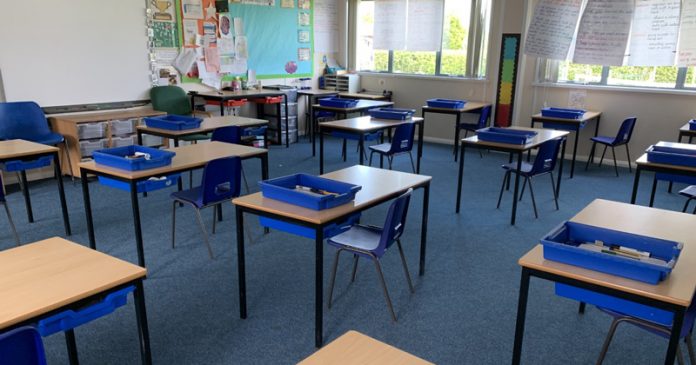Around half of the 2 million eligible children will actually return to school today, with worried parents keeping the rest at home for now.
According to a survey conducted by the National Foundation for Educational Research, primary school leaders expect that 47 percent of families will keep their children home.
Their report presents initial findings from an in-depth and representative study examining the impact of Covid-19 on mainstream schools in England.
It found that school leaders have fewer teaching staff available at a time when they need more with over a fifth of teachers who are available to work are only able to work at home. Senior leaders explained that they will need extra staff to teach and supervise pupils while on site, provide distance learning for pupils at home and/or cover for absent staff, plus additional funding to pay for this.
The findings also predict that when schools open to more pupils, 46 per cent of families, on average, will keep their children at home.Those with the highest proportion of free school meal (FSM) pupils estimate that more of their children’s families will keep them at home compared with an average estimate of 42 per cent from leaders with the lowest proportion of FSM pupils.
This,says the report, raises concerns that pupils in most need of access to education will be least likely to receive it. In line with the advice from SAGE clear messages will be needed from Government to encourage families to allow their children to return.
Meanwhile, heads feel least prepared for managing pupil movement around school and organising school space to enable social distancing . However, 65 per cent of primary and 73 per cent of secondary leaders think it would be at least somewhat feasible to operate a rota with different year groups or classes in school on different days.
The findings also suggest that the pandemic has had a greater impact on schools in the West Midlands, North West and London. School leaders were also more likely to estimate that a higher percentage of families would keep their children at home if they were based in the North West (50 per cent on average) compared with leaders in the South West (41 per cent on average).
Speaking about the findings Carole Willis, CEO at National Foundation for Educational Research, said:
“Today’s report suggests there is large variation between different types of schools, each experiencing their own challenges in opening to more pupils. Government guidance needs to be tailored and responsive, allowing flexibility for school leaders to use their professional judgement. This will be necessary to manage the differing and changeable levels of staffing, parental choices and practical accommodation issues that each school is likely to experience.
“The findings also reinforce concerns about children from disadvantaged backgrounds. Schools with a high proportion of free school meal children were the most affected before lockdown and expect fewer children to return, adding to concerns about their loss of learning. There needs to be very clear messages and reassurance for parents, as well as a continued focus on the quality of remote learning.”







